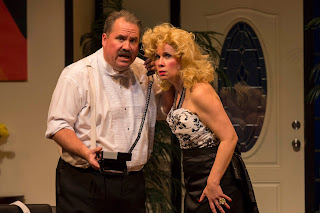With Neil Simon's "Rumors," Civic Theatre revels in a garden of spin and hearsay
 |
| So 20th century: Leonard Ganz and Chris Gorman try to consult a doctor. |
In "Rumors," Neil Simon puts concatenations of lying, innuendo, and "fake news" through close-order drill. There's no larger message here, because the community that comes under scrutiny is merely a daft selection of well-connected, well-off New York City people trying to squelch an embarrassing event: the attempted suicide of the city's deputy mayor.
In 2017, public embarrassment may have become as passe as telephones with cords on them. The spiraling black cord on the cast page of Civic Theatre's "Rumors" explicitly acknowledges the quaintness of Simon's farce. It's kind of charming to take a look into the not-so-distant past and realize how dependent so many cultural artifacts are on the restricted ways people once communicated. (I find the ruse that the singer of Irving Berlin's "Change Partners" uses to steal another guy's dance date especially delightful: "Ask him to sit this one out and while you're alone / I'll tell the waiter to tell him he's wanted on the telephone".)
Booth Tarkington Civic Theatre's production of the 1988 play was in its second weekend when I saw it Feb. 10. Charles Goad directs a cast as funny as it is fulminating. The triggering suicide attempt is itself ridiculous, the wound being a bloodied earlobe and the real explanation for it lying at the bottom of a continuously stirred stew pot. The scenario is that the incident has sidelined the deputy mayor and his wife on the evening of a party they're hosting to celebrate their tenth anniversary.
Guests gather two by two, bringing their own agendas with them, and gingerly come to grips with the situation, hiding the truth or rubbing it to the merest nubbin of itself. They also indulge in extraneous gossip and social game-playing that collectively confirm Simon's talent for keeping any number of circus plates spinning in the air.
 |
| Leonard Ganz (Parrish Williams) has things pointed out to him by wife Claire (Carrie Schlatter). |
Parrish Williams, playing a financial adviser with a low annoyance threshold, particularly raised the bar of exasperation and desperate improvisation, and Carrie Schlatter as Claire tossed in some of the gossip stew's more pungent spices.
Marni Lemons bubbled and fretted deliciously as the Cookie Cusack, a celebrity chef plagued by back spasms. Her husband, Ernie (Trevor Fanning), was amusingly adaptable in being pressed into kitchen service while trying to make sense of everything, taking a kind of psychologist's busman's holiday. He has some phone interference from his therapy group, an odd bit of scheduling that nonetheless serves the playwright's purpose of maximizing confusion.
There's even more phone interaction with the personal physician of several of the guests, as well as of the indisposed host. Eventually, no one wants to answer the phone. Such scenes are unimaginable among today's iPhone-carrying population. I envision younger Civic patrons musing about how strangely people lived back in the day, just as I used to marvel at my father's stories of the iceman coming by to replenish the icebox.
 |
| Joanne Kehoe plays a cop trying to get straight answers from frazzled party guests. |
Steve and Christine Kruze. In the last act, Joanne Kehoe, assisted by Joe Aiello, burst upon the scene as partner cops trying to get to the bottom of the shenanigans.
Farcical dialogue owes a lot to the ancient formula the Greeks called stycomythia — a technique of rapidly alternating lines that eventually became more at home in comedy than in serious drama. It can be difficult for actors to get the pace right: It must move along quite lively and yet not seem mechanical; the audience must believe characters could actually be saying these things in response to each other. This cast mostly had the back-and-forth down authentically; I felt there were only a few times when I sensed the engine humming along above what was being said.
In two places, when a character reports having "heard an enormous" loud noise, the interruption by another character at the word "enormous" was slow. The dramatic effect of an interrupted line is lost if there's any pause at all before the interruption. These were minor slips, but one of the problems of low comedy is the high demands it places on group technique.
In nearly every respect, the Civic cast spiritedly met those demands so as to keep the distinctive Simon pot simmering. The actors were dressed in wigs (where apt) by Debbie Williams and formal party wear by Adrienne Conces in order to cavort all the more incongruously on Ryan Koharchik's chic, geometrically well-proportioned set, complete with the farce genre's required multiplicity of doors.
[Photos by Zach Rosing]



Comments
Post a Comment